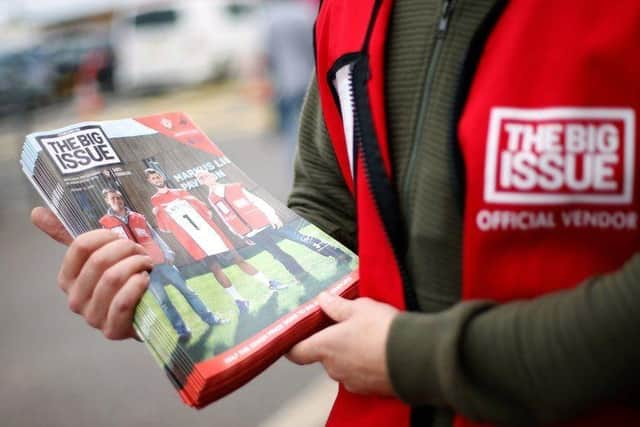Why Big Issue is more important than ever, says well being writer Lisa Fouweather
and live on Freeview channel 276
The Big Issue was founded in London in 1991 by John Bird, who had lived in an orphanage from the age of 7 to 10 and experienced homelessness himself - and Gordon Roddick, in response to the increasing numbers of homeless people living on the streets of London.
Inspired by ‘Street News’, a newspaper sold by homeless people in New York, the social enterprise was initially set-up with $50,000 in start-up capital from Roddick’s wife, Anita Roddick's business, the Body Shop.
Advertisement
Hide AdAdvertisement
Hide AdThe independent magazine is now entirely self-funded, with all funding coming from vendor sales.


How It Works
A legally recognised form of self-employment/a self-help option that entails working, not begging, vendors buy their magazines weekly from the Big Issue for £2 each, and sell them to their customers for £4 a time.
They keep the profit from every sale, with most choosing to reinvest it in buying more magazines to earn the money they need to lift themselves out of poverty.
Since being founded in 1991, The Big Issue is now the world’s most widely circulated street newspaper, having gone global with a series of sister titles in Australia, South Africa, Japan, Taiwan and Korea.
Advertisement
Hide AdAdvertisement
Hide AdFocusing on the UK alone though, in the three decades since its founding, over 107,000 vendors have, through the buying and selling of Big Issue magazines, earnt more than £150 million.
What’s more, last year alone saw over 3,500 vendors selling over 2.2 million magazines, a 34% increase on the previous year, and earning a collective £3.76 million in income.
Committed to helping anyone who needs a hand in life, the Big Issue is not reserved exclusively for homeless people, but to anyone who is struggling to earn their own income- whether that be people who are homeless or are at risk of becoming homeless, or people who are long-term unemployed/in need of extra cash to avoid falling into debt.
Why The Big Issue Is So Important
When around 14.4 million people are living in poverty in the UK right now, when one in five people are struggling to afford the basics to live, social enterprises such as the Big Issue are needed more than ever, particularly since the government are failing to act.
Advertisement
Hide AdAdvertisement
Hide AdIt was only two months ago that Britain’s (ex) home secretary, Suella Braverman, claimed that homelessness was a ‘lifestyle choice’, before going on to imply that the ‘eyesore’ of tents on Britain’s streets are more offensive than her own party’s lack of morals.
This serving as yet more evidence of the importance of charities/social enterprises like the Big Issue because, without them, what hope would people have?
‘Out of sight out of mind’ seems to be how the government want to play it - ‘get rid of their tents to get rid of them’, despite the fact that ‘getting rid of their tents’ will do absolutely nothing to solve the problem of homelessness.
All it will do is make the already extremely vulnerable, even more vulnerable, forcing them to sleep rough, unsheltered.
Advertisement
Hide AdAdvertisement
Hide AdThe Big Issue recognises the difficulties that the most marginalised members of our society face, whether they are homeless or ‘just’ struggling to make ends meet, which is why they have spent the past three decades making it their mission to tackle the problems that such people face ‘head on.’
How You Can Do Your ‘Bit’
Next time you’re out and about and you see a Big Issue vendor, consider buying a magazine from them.
When all of those little sales add up to see big changes, your £4 could just be someone else’s ray of hope.
And, if you can't afford to buy a magazine from them, talk to them, respond when they say good morning, smile back when they smile at you, doing so with the acknowledgment that they're just trying their best, (as we all are) and that they, as much as anyone, deserve respect (at the very least) for doing so.